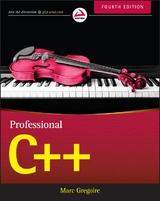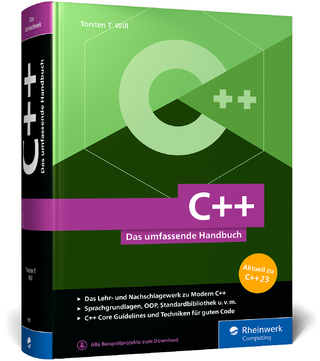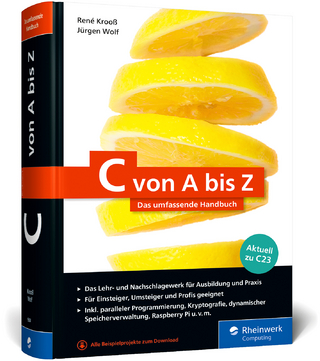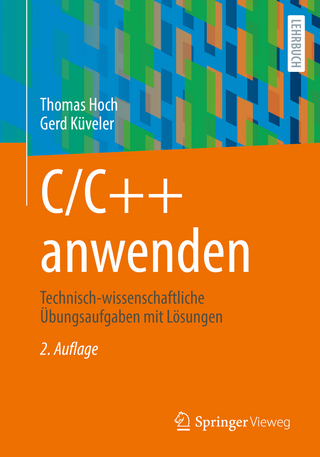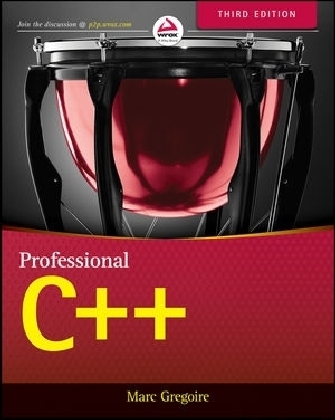
Professional C++
John Wiley & Sons Inc (Verlag)
978-1-118-85805-9 (ISBN)
- Titel ist leider vergriffen;
keine Neuauflage - Artikel merken
Master complex C++ programming with this helpful, in-depth resource From game programming to major commercial software applications, C++ is the language of choice. It is also one of the most difficult programming languages to master. While most competing books are geared toward beginners, Professional C++, Third Edition, shows experienced developers how to master the latest release of C++, explaining little known features with detailed code examples users can plug into their own codes. More advanced language features and programming techniques are presented in this newest edition of the book, whose earlier editions have helped thousands of coders get up to speed with C++. Become familiar with the full capabilities offered by C++, and learn the best ways to design and build applications to solve real-world problems. Professional C++, Third Edition has been substantially revised and revamped from previous editions, and fully covers the latest (2014) C++ standard. Discover how to navigate the significant changes to the core language features and syntax, and extensions to the C++ Standard Library and its templates.
This practical guide details many poorly understood elements of C++ and highlights pitfalls to avoid. * Best practices for programming style, testing, and debugging * Working code that readers can plug into their own apps * In-depth case studies with working code * Tips, tricks, and workarounds with an emphasis on good programming style Move forward with this comprehensive, revamped guide to professional coding with C++.
Marc Gregoire is a software engineer and developer of C/C++ applications for both Windows and Linux. He is a Microsoft Visual C++ MVP, the founder of the Belgian C++ users group, and is currently working on 3D laser scanning software for Nikon Metrology. He previously worked on critical 2G and 3G telecom software for Siemens and Nokia Siemens Networks. Marc maintains a blog at nuonsoft.com/blog. Wrox Professional guides are planned and written by working programmers to meet the real-world needs of programmers, developers, and IT professionals. Focused and relevant, they address the issues technology professionals face every day. They provide examples, practical solutions, and expert education in new technologies, all designed to help programmers do a better job.
INTRODUCTION xli Part I: INTRODUCTION TO PROFESSIONAL C++ CHAPTER 1: A CRA SH COURSE IN C++ AND THE STL 3 The Basics of C++ 4 Diving Deeper into C++ 25 C++ as an Object-Oriented Language 34 Summary 46 CHAPTER 2: WORKING WITH STRINGS 47 Dynamic Strings 47 Summary 55 CHAPTER 3: CODING WITH STYLE 57 Naming 68 Formatting 72 Summary 75 Part II: PROFESSIONAL C++ SOFTWAR E DESIGN CHAPTER 4: DESIGNING PROFESSIONAL C++ PROGRA MS 79 What Is Programming Design? 80 The Importance of Programming Design 80 Designing for C++ 82 Two Rules for C++ Design 83 Reusing Code 87 Deciding Whether or Not to Use the STL 98 Designing with Patterns and Techniques 98 Designing a Chess Program 99 Summary 105 CHAPTER 5: DESIGNING WITH OBJECTS 107 Am I Thinking Procedurally? 108 The Object-Oriented Philosophy 108 Living in a World of Objects 111 Abstraction 122 Summary 126 CHAPTER 6: DESIGNING FOR REUSE 127 The Reuse Philosophy 127 How to Design Reusable Code 128 Summary 140 Part III: CODING THE PROFESSIONAL WAY CHAPTER 7: GAINING PROFICIENCY WITH CLASSES AND OBJECTS 143 Introducing the Spreadsheet Example 144 Writing Classes 144 Summary 175 CHAPTER 8: MASTERING CLASSES AND OBJECTS 177 Dynamic Memory Allocation in Objects 178 Different Kinds of Data Members 188 More about Methods 193 Nested Classes 199 Enumerated Types Inside Classes 201 Friends 202 Operator Overloading 203 Summary 215 CHAPTER 9: DISCOVERING INHERITANCE TECHNIQUES 217 Building Classes with Inheritance 218 Multiple Inheritance 244 Interesting and Obscure Inheritance Issues 249 Summary 271 CHAPTER 10: C++ QUIRKS, ODDITIES, AND INCIDENTALS 273 References 274 Types and Casts 295 Summary of Casts 301 Scope Resolution 302 C++11 / C++14 303 Header Files 309 C Utilities 310 Summary 313 CHAPTER 11: WRITING GENERIC CODE WITH TEMPLATES 315 Overview of Templates 316 Class Templates 317 Function Templates 339 Variable Templates 343 Summary 343 CHAPTER 12: DEMYSTIFYING C++ I/O 345 Using Streams 346 String Streams 360 File Streams 362 Bidirectional I/O 366 Summary 367 CHAPTER 13: HANDLING ERR ORS 369 Errors and Exceptions 370 Exception Mechanics 372 Exceptions and Polymorphism 387 Stack Unwinding and Cleanup 394 Common Error-Handling Issues 397 Putting It All Together 405 Summary 409 CHAPTER 14: OVERLOADING C++ OPERA TORS 411 Overview of Operator Overloading 412 Overloading the Arithmetic Operators 420 Overloading the Bitwise and Binary Logical Operators 421 Overloading the Insertion and Extraction Operators 422 Overloading the Subscripting Operator 423 Overloading the Function Call Operator 428 Overloading the Dereferencing Operators 429 Writing Conversion Operators 432 Overloading the Memory Allocation and Deallocation Operators 436 Summary 442 CHAPTER 15: OVERVIEW OF THE C++ STANDARD LIBRARY 443 Coding Principles 444 Overview of the C++ Standard Library 445 Summary 465 CHAPTER 16: UNDERSTANDING CONTAINERS AND ITERATORS 467 Containers Overview 468 Sequential Containers 473 Container Adapters 498 Associative Containers 504 Unordered Associative Containers/Hash Tables 516 Other Containers 523 Summary 529 CHAPTER 17: MASTERING STL ALGORITHMS 531 Overview of Algorithms 532 Lambda Expressions 536 Function Objects 542 Algorithm Details 550 Algorithms Example: Auditing Voter Registrations 570 Summary 573 CHAPTER 18: STRING LOCALIZATION AND REGULAR EXPRESSIONS 575 Localization 575 Regular Expressions 581 ECMAScript Syntax 582 Summary 599 CHAPTER 19: ADDITIONAL LIBRARY UTILITIES 601 std::function 601 Ratios 603 The Chrono Library 606 Random Number Generation 612 Tuples 621 Summary 624 Part IV: MASTERING ADVANCED FEATURES OF C++ CHAPTER 20: CUSTOMIZING AND EXTENDING THE STL 627 Allocators 628 Iterator Adapters 628 Extending the STL 634 Summary 671 CHAPTER 21: ADVANCED TEMPLATES 673 More about Template Parameters 673 Class Template Partial Specialization 679 Emulating Function Partial Specialization with Overloading 683 Template Recursion 685 Type Inference 689 Variadic Templates 691 Metaprogramming 695 Summary 705 CHAPTER 22: MEMORY MANAGEMENT 707 Working with Dynamic Memory 708 Array-Pointer Duality 720 Low-Level Memory Operations 722 Smart Pointers 727 Common Memory Pitfalls 734 Summary 740 CHAPTER 23: MULTITHREADED PROGRAMMING WITH C++ 741 Introduction 742 Threads 746 Atomic Operations Library 755 Mutual Exclusion 758 Condition Variables 767 Futures 770 Example: Multithreaded Logger Class 772 Thread Pools 776 Threading Design and Best Practices 777 Summary 778 Part V: C++ SOFTWAR E ENGINEERING CHAPTER 24: MAXIMIZING SOFTWARE ENGINEERING METHODS 781 The Need for Process 782 Software Life Cycle Models 783 Software Engineering Methodologies 789 Building Your Own Process and Methodology 796 Source Code Control 797 Summary 799 CHAPTER 25: WRITING EFFICIENT C++ 801 Overview of Performance and Efficiency 802 Language-Level Efficiency 803 Design-Level Efficiency 808 Profiling 813 Summary 825 CHAPTER 26: CONQUERING DEBUGGING 827 The Fundamental Law of Debugging 828 Bug Taxonomies 828 Avoiding Bugs 828 Planning for Bugs 829 Debugging Techniques 842 Summary 861 APPENDIX A: C++ INTERVIEWS 863 Chapter 1: A Crash Course in C++ and the STL 863 Chapters 2 and 18: Strings, Localization, and Regular Expressions 864 Chapter 3: Coding with Style 865 Chapter 4: Designing Professional C++ Programs 866 Chapter 5: Designing with Objects 868 Chapter 6: Designing for Reuse 868 Chapters 7 and 8: Classes and Objects 869 Chapter 9: Discovering Inheritance Techniques 872 Chapter 10: C++ Quirks, Oddities, and Incidentals 873 Chapters 11 and 21: Templates 875 Chapter 12: Demystifying C++ I/O 875 Chapter 13: Handling Errors 876 Chapter 14: Overloading C++ Operators 877 Chapters 15, 16, 17, and 20: The Standard Template Library 878 Chapter 19: Additional Library Utilities 878 Chapter 22: Memory Management 879 Chapter 23: Multithreaded Programming with C++ 880 Chapter 24: Maximizing Software Engineering Methods 881 Chapter 25: Writing Efficient C++ 882 Chapter 26: Conquering Debugging 882 APPENDIX B: ANNOTATED BIBLIOGRAPHY 885 C++ 885 C 889 Unified Modeling Language, Uml 889 Algorithms and Data Structures 890 Random Numbers 890 Open-Source Software 890 Software Engineering Methodology 891 Programming Style 892 Computer Architecture 892 Efficiency 893 Testing 893 Debugging 893 Design Patterns 893 Operating Systems 894 Multithreaded Programming 894 APPENDIX C: STANDARD LIBRARY HEADER FILES 895 The C Standard Library 895 Containers 897 Algorithms, Iterators, and Allocators 898 General Utilities 898 Mathematical Utilities 899 Exceptions 899 I/O Streams 900 Threading Library 901 INDEX 903
| Verlagsort | New York |
|---|---|
| Sprache | englisch |
| Maße | 185 x 235 mm |
| Gewicht | 1612 g |
| Themenwelt | Informatik ► Programmiersprachen / -werkzeuge ► C / C++ |
| ISBN-10 | 1-118-85805-0 / 1118858050 |
| ISBN-13 | 978-1-118-85805-9 / 9781118858059 |
| Zustand | Neuware |
| Informationen gemäß Produktsicherheitsverordnung (GPSR) | |
| Haben Sie eine Frage zum Produkt? |
aus dem Bereich
